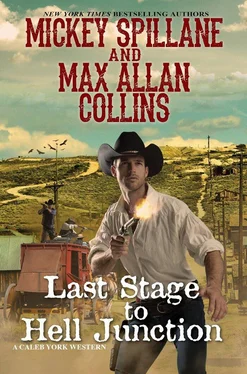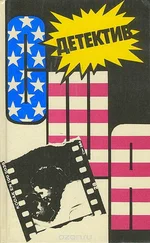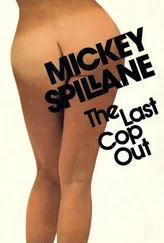From the stairs, Juanita said to Hargrave, “He speaks true, querida . It would not be this York’s... what is the word?”
“Jurisdiction,” Hargrave said softly, mulling it.
York stepped up and said, “Why are we afraid of one man, anyway? I’m new to this outfit, I know, but I got a right to speak my piece.”
Reese scowled at York, pointed a finger at him. “You don’t git a vote.” Then to Hargrave: “I say we pack up and head outa here. Toss in our cards and take the game elsewheres.”
Hargrave threw his red arms in the air, as if he were the one being robbed. This silenced the room. The arms came down. He wheeled slowly as he spoke, making sure his entire audience took it in.
“Is there any reason,” he said in that resonant, trained voice, “to think this Caleb York would come looking for the doctor — or indeed any of us — here at Hell Junction?”
Looks were exchanged among the outlaws, “Bret McCory” included. Slowly, one by one, they shook their heads.
“That,” Hargrave said, “is an opinion I share. We will stay. We will take what comes.”
That was met with silence, not applause. But no further argument ensued.
The outlaw actor turned his gaze on York. “I’m afraid our young fool Randabaugh cannot be trusted with a simple task. The master key is behind the check-in desk.” He indicated the wall of keys. “Get it.”
York went back there and did so.
“Make sure,” Hargrave said, “our honored guests are tucked in and locked away for the remainder of the night. Then come back down, Bret my good man, and we’ll talk. I have something in mind for you.”
“All right,” York said with a shrug.
Hargrave spoke to the assembly. “In a few hours it will be dawn. Now back to bed, all of you!” He turned to Randy, who looked more hurt by the slight than the slap. “ ‘Asses are made to bear, and so are you.’ Resume your post.”
Addressing Parker and the women, Randy yelled, “All right, you people! Git back upstairs!” This he delivered with an authority that he didn’t seem to buy himself.
York followed them up, a shaky Randy getting back into his corner but staying on his feet, holding his gun on everybody.
“Bret McCory” locked the women in their rooms first and then bid Parker enter his, whispering, “I am locking this, but I’ll hold onto the key.”
As reassuring as that was, the lock clicking, as the businessman faced that closed door, had an ominous sound.
Blaine Hargrave — born Benjamin Harper in Paterson, New Jersey, son of a gambler and a seamstress — created for himself a British background, after deserting from the 28th Massachusetts Volunteer Infantry Regiment during the War Between the States. The Hargrave name came from a Boston boy who had died at Fredericksburg of a bullet in the head, right beside Harper at the time, prompting his decision to flee.
Hargrave’s trace of an English accent, and likely his rogue ways, he’d picked up from his papa, who had been run out of London long before Blaine’s birth. His mother, born in New Jersey, was as literate as the family was intermittently poor, and had steeped in her son a love of Shakespeare, while making him feel special and gifted.
Which, of course, he was.
For a dozen years Hargrave was among New York theater’s most successful, celebrated actors. His roles included Hamlet, King Lear, Macbeth, Shylock, and Richard III, and his conquests included numerous actresses, but more significantly the wives of several theatrical producers, which had led to his banishment from the Broadway boards, followed by the life of a traveling player, largely in the American West.
That life, as it happened, had appealed to him. He had picked up the tricks of a card sharp from his late father — shot to death at a poker table when Blaine was sixteen — and, often in the same saloons where he performed in various Shakespearean productions, Hargrave would add to his thespian earnings with poker winnings.
The man, who had interrupted a performance with admittedly true accusations about Hargrave cheating at cards, had peppered his heckling with aspersions cast upon Blaine’s dusky female companion and, worse, his acting abilities.
The Hargrave flair for the dramatic had led to killing the man with his own gun, right there toward the front of the audience. The actor had known almost at once that this performance would be his most memorable, and it heralded a new chapter in a tempestuous life. He had been born to the stage. Now he was robbing them.
He felt the role of road agent was a temporary detour on his path, if an exciting, often exhilarating one. Kidnapping the Denver businessman would bring considerable booty, which — added to what he’d already accumulated — put his ultimate goal in sight.
His intention was to establish a theater of his own, somewhere in Canada, where he could once again pursue his art. Extradition between the United States and its northern neighbor was rare, covering only murder and forgery. And the latter was not one of his skills, while he had never been formally charged with the former.
As he sat, deep in the night, in the Hale Junction Inn’s parlor, on the two-seater sofa where earlier his two female hostages had perched, Hargrave pondered the problem that had unexpectedly arisen. Ned Clutter’s death, while no terrible loss to Western civilization (in any sense), meant that no progress toward delivering a ransom demand had been made.
But he considered this setback to be a minor one, particularly since he’d had the good fortune of adding a new and most worthy cast member. This Bret McCory was obviously made of sterner stuff than the scruffy spear carriers Hargrave had accumulated in his latest company of traveling players.
But could Hargrave trust him? He must get a feel for the man.
Out in the lobby, Bret McCory was coming down, flicking a smile the actor’s way.
Hargrave called out to him: “Join me! We have much to discuss.”
McCory, moving with grace and ease, came across to the parlor. He looked around for a chair to pull over, but Hargrave patted the cushion next to him.
“Sit, please.”
McCory did, leaning an elbow against the armrest, keeping some distance as he half-turned to look at Hargrave.
“Discuss away,” he said.
“You have arrived,” Hargrave said, launching right into his soliloquy, “at a most opportune moment. Not only have I lost a good man... fairly good man... another of my bunch is wounded and momentarily of limited use. This leaves me sitting here in this shabby castle with hostages taken half a day ago or more, but with no method or means at hand to seek the desired ransom.”
“A right mess,” McCory said.
“Additionally, I’m told this Caleb York — a gunfighter who calls himself a detective, and is now a lawman — was responsible for the loss of that good man—”
“ Fairly good,” McCory put in.
Hargrave twitched a smile. “ Fairly good man... which means he may well be on our trail, although why this York creature would think to look for us here escapes me.”
“Some in Trinidad may know of this Inn. Though I doubt they’d tell a sheriff they were doing business with such an establishment.”
“Yes, I doubt they would at that. What about this York?”
“Never met the man.”
“No?”
McCory shifted on the sofa. “I hear he’s a killer, though. This Reese of yours is right. When a poster says ‘dead or alive,’ York only sees that first word. So it’s said.”
“Sounds more bounty hunter than sheriff.”
McCory shrugged a shoulder. “That’s part of how these sheriffs make a living, collectin’ rewards. Their actual pay is small potatoes.”
Читать дальше





![Микки Спиллейн - Death of the Too-Cute Prostitute [= Man Alone]](/books/437201/mikki-spillejn-death-of-the-too-thumb.webp)